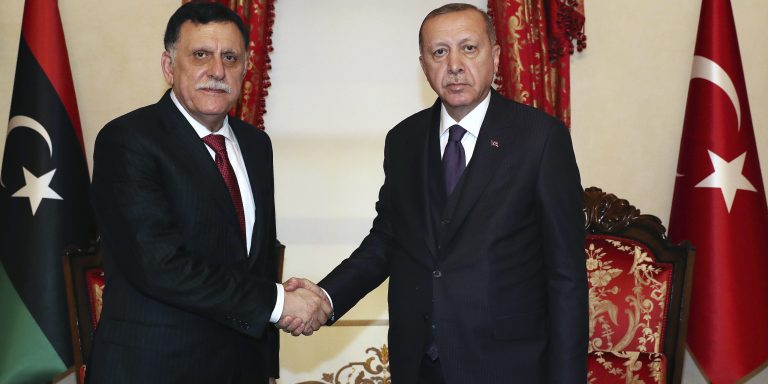INTELBRIEF
December 19, 2019
IntelBrief: External Powers Set Their Sights on Libya

- Turkish President Erdogan recently suggested that Ankara might intervene militarily in Libya if requested by the government in Tripoli.
- A Turkish intervention to support the Government of National Accord would put Ankara in direct odds with Russia, as Moscow continues to back strongman Khalifa Haftar.
- Russian support has enabled Haftar’s militia to surge toward the capital, where the recognized government is increasingly beleaguered.
- After eight years of civil war and insurgency, Libya is in dire need of external actors committed to forging a peace agreement, not prolonging the conflict in pursuit of narrowly defined interests.
.
The ongoing war in Libya is a catastrophe that has spawned a persistent humanitarian crisis along the shores of the Mediterranean Sea. For the past eight years, the country has been engulfed in civil war, with the internationally recognized Government of National Accord (GNA) battling the Libyan National Army (LNA), led by Khalifa Haftar, an authoritarian general who has helped finance his efforts through a range of criminal activities. Haftar has powerful backers, including the United Arab Emirates (UAE), Egypt, and now Russia. France has also offered support to Haftar, as some voices in the West are arguing that Libya is in dire need of a ‘strongman’ to combat the many violent extremist groups operating throughout the country, including the Islamic State and al-Qaeda. More recently, Russian support has tipped the balance of power in the war, as a range of troops and mercenaries are assisting the LNA in its attempts to take the capital, Tripoli, from the GNA. In late November, Turkish President Recep Tayyip Erdogan and the GNA signed memorandums of understanding on maritime boundaries and security cooperation.
Libya is awash with weapons, with the U.N.-authorized arms embargo for the country routinely violated. A December 9 UN report highlights the UAE, Jordan, and Turkey as the main violators, as the first two supply weapons to Haftar while Turkey supports the GNA. The report was completed before Moscow moved decisively into the conflict—Russia is supplying mercenary troops to fight alongside Haftar’s forces. Ghassan Salame, the UN special envoy for Libya, identified external military intervention as the single biggest threat to prospects for peace in Libya. The U.N. has proven unable to craft an opening for a sustainable ceasefire and the conflict continues to spiral out of control. There exists a glimmer of hope that the U.N. report might shame member nations into ceasing their violations of the arms embargo, though on the whole prospects seem dim. It is more likely that arms shipments and mercenary forces will continue to flow into Libya, further destabilizing the country and providing Haftar with an opportunity to consolidate control over vast swaths of territory.
In addition to wreaking havoc on Libya’s society and economy, warring parties are responsible for creating conditions that have contributed to state failure. Within the confines of the collapse, untold numbers of desperate refugees have attempted to cross the Mediterranean to reach Europe. Thousands have died trying to make this perilous journey in unsafe and overcrowded makeshift vessels, while thousands more languish in refugee detention camps. These camps offer little protection from the horrors of the war. An airstrike, almost certainly conducted by a foreign government, on the Tajoura refugee camp on July 2 killed at least 54 refugees. To date, no parties have been held responsible for this war crime. Meanwhile, Haftar’s forces have conducted hundreds of attacks enabled by illegal arms shipments from external actors, including Chinese made drones supplied by the UAE. Turkish President Recep Tayyip Erdogan has pledged to level the playing field by sending drones, tanks, special forces, and commando units to back the GNA. Erdogan and Russian President Vladimir Putin spoke by phone last week to talk about Syria and Libya, although it remains unclear what the result of the discussion was.
In response to Russia’s momentum-altering support for Haftar, Turkey has said it might intervene militarily on behalf of the GNA if requested to do so by Tripoli. Erdogan recently stated that ’in case of such an invitation, (from the GNA), Turkey will decide itself about what kind of initiative to undertake’ and made clear he meant Turkish soldiers, not just Turkish weapons. The prospect of urban fighting in Tripoli between forces that include Russian mercenaries on one side and Turkish soldiers on the other is no longer far-fetched. This scenario would introduce an entirely new dynamic to the conflict and one that would further derail any hopes of forging a peace agreement in the foreseeable future. The more external forces involved in a country’s civil war, the more complicated the situation becomes on the ground, the more civilians will suffer, and the longer the protracted conflict could last.
.
For tailored research and analysis, please contact: info@thesoufancenter.org